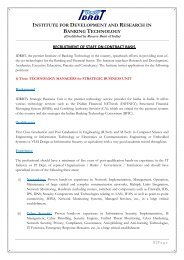Newsletter, October 2009 - IDRBT
Newsletter, October 2009 - IDRBT
Newsletter, October 2009 - IDRBT
Create successful ePaper yourself
Turn your PDF publications into a flip-book with our unique Google optimized e-Paper software.
Fast Forward<br />
<strong>October</strong> <strong>2009</strong><br />
Even though virtually any services company must<br />
adopt CRM, it becomes mandatory for some<br />
companies. Companies dealing with banking,<br />
finance, retail, insurance, airlines and hotels,<br />
telecommunications and healthcare benefit a lot<br />
from installing CRM software (Grigonis, 2000).<br />
The need for CRM installation increases with the<br />
number of channels to access customers and the<br />
number of touch points with customers.<br />
On High failure rate of CRM Projects<br />
A Butler Group study reported that 70 percent of<br />
CRM implementations fail. A Gartner study<br />
reported that approximately 55 percent of all<br />
CRM projects failed to meet customers'<br />
expectations. Many people believe that these<br />
"failures" are the result of the tools themselves,<br />
which is usually not true. Another problem is that<br />
many of the reports define success based on the<br />
management's impressions and not on the<br />
evidence of return on investment (RoI).<br />
A new study, jointly conducted by Crmguru.com,<br />
Mangen Research Associates and Caribou Lake<br />
Customer-1, differs significantly by taking a closer<br />
look at CRM implementations as well as the<br />
factors that influence RoI. They reported that<br />
only 35 percent of CRM implementations, when<br />
considered over their entire life, can be<br />
considered failures. That's less than half the<br />
failure rate noted in some analyst reports.<br />
In contrast, 45 percent of CRM implementations<br />
are producing a payback. Most CRM failures are<br />
the result of poor implementations rather than a<br />
problem with the technology or the underlying<br />
concepts of CRM. There are four key<br />
implementation related factors that determine the<br />
success of CRM projects:<br />
Adopting a customer-centric strategy :<br />
This is the most important factor.<br />
Customers of today behave differently<br />
from those of just a few years ago. They<br />
realise the fact that they have a choice<br />
and they can demand more from sellers for the<br />
money they spend.<br />
SETTING THE TONE : Shri. B. Sambamurthy, Director, <strong>IDRBT</strong>, inaugurating the<br />
Programme on Beyond Core Banking held from April 15 - 17, <strong>2009</strong> at <strong>IDRBT</strong><br />
15
















